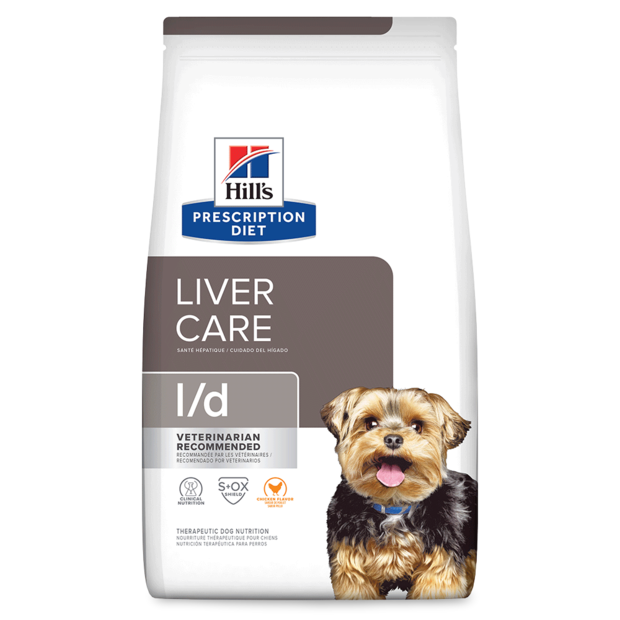Liver Disease in Dogs
A complete guide to liver disease for dog owners
This article is written by Pet Circle's qualified veterinarian,
The liver is the second largest organ in the body and performs countless vital functions such as the removal of toxic substances from the bloodstream and helping with digestion and clotting. When the liver is no longer working correctly there are widespread negative effects throughout the body. Because the liver works to filter so many substances from the body, it is susceptible to insult and injury from many different sources. With so many potential causes of liver disease combined with often very non-specific clinical signs, liver disease can be extremely challenging to diagnose correctly.
Contents
3. Signs and Symptoms of Liver disease
4. Diagnosis
5. Treatment
The 4 Stages of Liver Disease
The liver has a huge functional reserve and the impressive ability to regenerate following injury. If liver disease is caught early and treated appropriately the liver can regenerate and dogs can recover to live a healthy, happy life. Unfortunately, in more severe cases the liver disease can be too significant to recover from.
Stage 1. Abnormal Inflammation: this first stage can typically be treated with medication and/or dietary changes.
Stage 2. Fibrosis: at this point the inflamed liver starts to scar and harden. If caught at this stage, it can still be treated and reversed
Stage 3. Cirrhosis: permanent, irreversible liver scarring.
Stage 4. Liver Failure: at this stage the dog's liver can no longer function properly and is too advanced to be treated
What Causes Liver Disease?

Source: puppyup.org
There are a multitude of causes of liver disease in dogs. In some cases a specific cause cannot be determined and the liver disease is classified as idiopathic; meaning no cause identified. Some dog breeds are also genetically more prone to being born with or developing liver disease. If you are considering getting a new puppy, read our vet article How to Find a Good Breeder including questions to ask about genetic disease.
Common Causes of Liver Disease
- Toxin Ingestion (plants, pesticides, algae, mould, certain mushrooms, medications, chemical cleaners)
- Trauma (direct injury, heat stroke, poor tissue perfusion)
- Viral Infections
- Congenital Conditions
- Cancer
What are the Signs of Liver Disease?

When caught early there is a much greater chance of recovery, making early identification so important. Unfortunately the signs of liver disease can be very similar to those of other conditions which can make diagnosis a little tricky.
Clinical signs of Liver Disease in Dogs include:
- Lethargy
- Reduced appetite
- Weight Loss
- Increased thirst
- Vomiting or diarrhoea
- Jaundice (yellowing of skin and white of eyes)
- Changes in behaviour
- Bloated abdomen
- Seizures
If you notice any of these symptoms in your dog, check in with your veterinarian.
How is Liver Disease Diagnosed?
There are a number of diagnostics your veterinarian may use to reach a diagnosis of liver disease. Some commonly run tests for liver disease include:
- Blood tests
- Urinalysis
- Radiography
- Ultrasonography
How is Liver Disease Treated?

Treatment of liver disease is often supportive in nature but can vary depending on the degree of disease as well as specific cause (congenital condition vs liver cancer vs autoimmune condition etc) if one is identified.
Treating liver disease has several goals including treating the underlying cause, reducing inflammation and potential scarring of the liver, providing supportive care, and treating any complications that may have arisen from the disease. IV fluid therapy, antioxidant therapy, antinausea medications, and dietary changes are widely used in the treatment of liver disease.
Liver Diets for Dogs
When your dog has liver disease nutritional management can be an effective approach when used in conjunction with medical (or surgical) treatment. The liver has an amazing capacity to heal, and veterinary prescription liver diets are formulated to support the liver during this process. They contain controlled levels of high-quality protein to reduce the liver's workload, reduced sodium to control blood pressure, and l-carnitine to assist with fat metabolism. They also contain antioxidants and low levels of copper to minimize copper accumulation in liver cells.
Liver Diets & Supplements for Dogs
Will my dog always have to eat a special food?
Managing liver disease is a complex process and usually requires repeat assessments with your veterinarian to ensure your dog is improving and staying in good health. Many dogs with liver disease will be able to stop medications and prescription diets once their liver disease has resolved. However, some cases of liver disease and those dogs diagnosed with chronic liver disease will likely continue on a therapeutic diet and liver-supporting medication long-term. It is very case specific so your veterinarian will work closely with you to determine the best management plan to keep your furry friend in their best health.



























